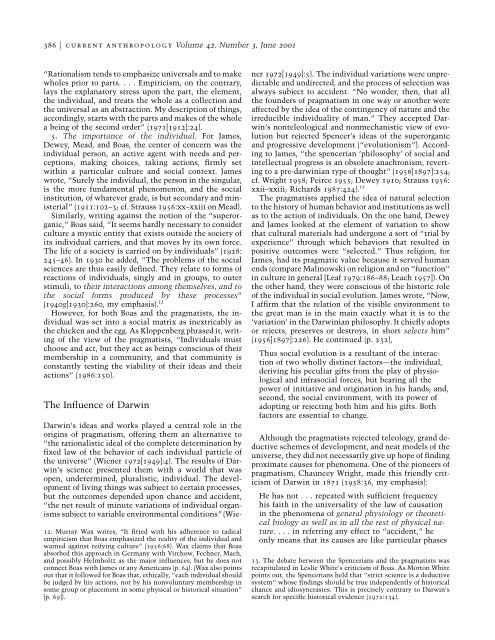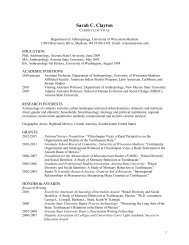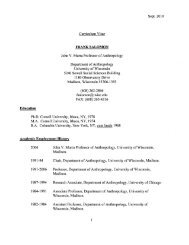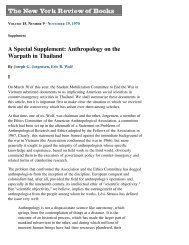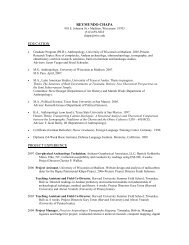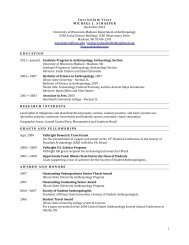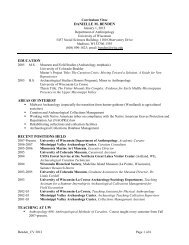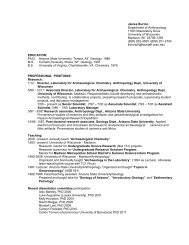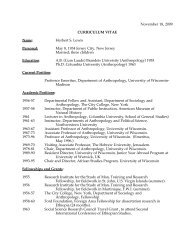Boas, Darwin, Science, and Anthropology1 - Department of ...
Boas, Darwin, Science, and Anthropology1 - Department of ...
Boas, Darwin, Science, and Anthropology1 - Department of ...
You also want an ePaper? Increase the reach of your titles
YUMPU automatically turns print PDFs into web optimized ePapers that Google loves.
386 F current anthropology Volume 42, Number 3, June 2001<br />
“Rationalism tends to emphasize universals <strong>and</strong> to make<br />
wholes prior to parts. . . . Empiricism, on the contrary,<br />
lays the explanatory stress upon the part, the element,<br />
the individual, <strong>and</strong> treats the whole as a collection <strong>and</strong><br />
the universal as an abstraction. My description <strong>of</strong> things,<br />
accordingly, starts with the parts <strong>and</strong> makes <strong>of</strong> the whole<br />
a being <strong>of</strong> the second order” (1971[1912]:24).<br />
5. The importance <strong>of</strong> the individual. For James,<br />
Dewey, Mead, <strong>and</strong> <strong>Boas</strong>, the center <strong>of</strong> concern was the<br />
individual person, an active agent with needs <strong>and</strong> perceptions,<br />
making choices, taking actions, firmly set<br />
within a particular culture <strong>and</strong> social context. James<br />
wrote, “Surely the individual, the person in the singular,<br />
is the more fundamental phenomenon, <strong>and</strong> the social<br />
institution, <strong>of</strong> whatever grade, is but secondary <strong>and</strong> ministerial”<br />
(1911:102–3; cf. Strauss 1956:xx–xxiii on Mead).<br />
Similarly, writing against the notion <strong>of</strong> the “superorganic,”<br />
<strong>Boas</strong> said, “It seems hardly necessary to consider<br />
culture a mystic entity that exists outside the society <strong>of</strong><br />
its individual carriers, <strong>and</strong> that moves by its own force.<br />
The life <strong>of</strong> a society is carried on by individuals” (1928:<br />
245–46). In 1930 he added, “The problems <strong>of</strong> the social<br />
sciences are thus easily defined. They relate to forms <strong>of</strong><br />
reactions <strong>of</strong> individuals, singly <strong>and</strong> in groups, to outer<br />
stimuli, to their interactions among themselves, <strong>and</strong> to<br />
the social forms produced by these processes”<br />
(1940g[1930]:260, my emphasis). 12<br />
However, for both <strong>Boas</strong> <strong>and</strong> the pragmatists, the individual<br />
was set into a social matrix as inextricably as<br />
the chicken <strong>and</strong> the egg. As Kloppenberg phrased it, writing<br />
<strong>of</strong> the view <strong>of</strong> the pragmatists, “Individuals must<br />
choose <strong>and</strong> act, but they act as beings conscious <strong>of</strong> their<br />
membership in a community, <strong>and</strong> that community is<br />
constantly testing the viability <strong>of</strong> their ideas <strong>and</strong> their<br />
actions” (1986:150).<br />
The Influence <strong>of</strong> <strong>Darwin</strong><br />
<strong>Darwin</strong>’s ideas <strong>and</strong> works played a central role in the<br />
origins <strong>of</strong> pragmatism, <strong>of</strong>fering them an alternative to<br />
“the rationalistic ideal <strong>of</strong> the complete determination by<br />
fixed law <strong>of</strong> the behavior <strong>of</strong> each individual particle <strong>of</strong><br />
the universe” (Wiener 1972[1949]:4). The results <strong>of</strong> <strong>Darwin</strong>’s<br />
science presented them with a world that was<br />
open, undetermined, pluralistic, individual. The development<br />
<strong>of</strong> living things was subject to certain processes,<br />
but the outcomes depended upon chance <strong>and</strong> accident,<br />
“the net result <strong>of</strong> minute variations <strong>of</strong> individual organisms<br />
subject to variable environmental conditions” (Wie-<br />
12. Murray Wax writes, “It fitted with his adherence to radical<br />
empiricism that <strong>Boas</strong> emphasized the reality <strong>of</strong> the individual <strong>and</strong><br />
warned against reifying culture” (1956:68). Wax claims that <strong>Boas</strong><br />
absorbed this approach in Germany with Virchow, Fechner, Mach,<br />
<strong>and</strong> possibly Helmholtz as the major influences, but he does not<br />
connect <strong>Boas</strong> with James or any Americans (p. 64). (Wax also points<br />
out that it followed for <strong>Boas</strong> that, ethically, “each individual should<br />
be judged by his actions, not by his nonvoluntary membership in<br />
some group or placement in some physical or historical situation”<br />
[p. 69]).<br />
ner 1972[1949]:5). The individual variations were unpredictable<br />
<strong>and</strong> undirected, <strong>and</strong> the process <strong>of</strong> selection was<br />
always subject to accident. “No wonder, then, that all<br />
the founders <strong>of</strong> pragmatism in one way or another were<br />
affected by the idea <strong>of</strong> the contingency <strong>of</strong> nature <strong>and</strong> the<br />
irreducible individuality <strong>of</strong> man.” They accepted <strong>Darwin</strong>’s<br />
nonteleological <strong>and</strong> nonmechanistic view <strong>of</strong> evolution<br />
but rejected Spencer’s ideas <strong>of</strong> the superorganic<br />
<strong>and</strong> progressive development (“evolutionism”). According<br />
to James, “the spencerian ‘philosophy’ <strong>of</strong> social <strong>and</strong><br />
intellectual progress is an obsolete anachronism, reverting<br />
to a pre-darwinian type <strong>of</strong> thought” (1956[1897]:254;<br />
cf. Wright 1958; Peirce 1955; Dewey 1910; Strauss 1956:<br />
xxii–xxiii; Richards 1987:424). 13<br />
The pragmatists applied the idea <strong>of</strong> natural selection<br />
to the history <strong>of</strong> human behavior <strong>and</strong> institutions as well<br />
as to the action <strong>of</strong> individuals. On the one h<strong>and</strong>, Dewey<br />
<strong>and</strong> James looked at the element <strong>of</strong> variation to show<br />
that cultural materials had undergone a sort <strong>of</strong> “trial by<br />
experience” through which behaviors that resulted in<br />
positive outcomes were “selected.” Thus religion, for<br />
James, had its pragmatic value because it served human<br />
ends (compare Malinowski on religion <strong>and</strong> on “function”<br />
in culture in general [Leaf 1979:186–88; Leach 1957]). On<br />
the other h<strong>and</strong>, they were conscious <strong>of</strong> the historic role<br />
<strong>of</strong> the individual in social evolution. James wrote, “Now,<br />
I affirm that the relation <strong>of</strong> the visible environment to<br />
the great man is in the main exactly what it is to the<br />
‘variation’ in the <strong>Darwin</strong>ian philosophy. It chiefly adopts<br />
or rejects, preserves or destroys, in short selects him”<br />
(1956[1897]:226). He continued (p. 232),<br />
Thus social evolution is a resultant <strong>of</strong> the interaction<br />
<strong>of</strong> two wholly distinct factors—the individual,<br />
deriving his peculiar gifts from the play <strong>of</strong> physiological<br />
<strong>and</strong> infrasocial forces, but bearing all the<br />
power <strong>of</strong> initiative <strong>and</strong> origination in his h<strong>and</strong>s; <strong>and</strong>,<br />
second, the social environment, with its power <strong>of</strong><br />
adopting or rejecting both him <strong>and</strong> his gifts. Both<br />
factors are essential to change.<br />
Although the pragmatists rejected teleology, gr<strong>and</strong> deductive<br />
schemes <strong>of</strong> development, <strong>and</strong> neat models <strong>of</strong> the<br />
universe, they did not necessarily give up hope <strong>of</strong> finding<br />
proximate causes for phenomena. One <strong>of</strong> the pioneers <strong>of</strong><br />
pragmatism, Chauncey Wright, made this friendly criticism<br />
<strong>of</strong> <strong>Darwin</strong> in 1871 (1958:36, my emphasis):<br />
He has not . . . repeated with sufficient frequency<br />
his faith in the universality <strong>of</strong> the law <strong>of</strong> causation<br />
in the phenomena <strong>of</strong> general physiology or theoretical<br />
biology as well as in all the rest <strong>of</strong> physical nature.<br />
...inreferring any effect to “accident,” he<br />
only means that its causes are like particular phases<br />
13. The debate between the Spencerians <strong>and</strong> the pragmatists was<br />
recapitulated in Leslie White’s criticism <strong>of</strong> <strong>Boas</strong>. As Morton White<br />
points out, the Spencerians held that “strict science is a deductive<br />
system” whose findings should be true independently <strong>of</strong> historical<br />
chance <strong>and</strong> idiosyncrasies. This is precisely contrary to <strong>Darwin</strong>’s<br />
search for specific historical evidence (1972:134).


